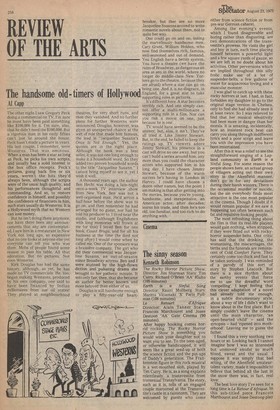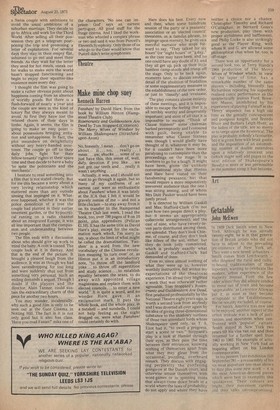Cinema The sinny season Kenneth Robinson
The Rocky Horror Picture Show. Director: Jim Sharman Stars: Tim Curry, Richard O'Brien 'AA' Rialto (1(15 minutes) Earth is a Sinful Song Director: Rauni Mollberg Stars: Maritta Viitamaki 'X' Paris Pullman (108 minutes) Le Retourt d'Afrique Director: Alain Tanner Stars: Francois Marchouret and Josee Destoon 'AA' Gate Cinema (90 minutes).
After happy hooking comes horrid rocking. The Rocky Horror Picture Show is something you would wish your daughter not to want you to see. To the teen-aged, or otherwise handicapped, it will seem like a great send-up of both the science fiction and the pin-ups of Daddy's generation. The Frankenstein figure in this rock musical is a wet-mouthed slob, played by Tim Curry. He is, as a song explains relentlessly, a transvestite from transexual Transylvania. The story, such as it is, tells of an engaged couple marooned at the Transvestite's castle in a rainstorm. They are welcomed by guests who come
either from science fiction or from pre-war German cabaret.
Among the evening's events, which I found disagreeable and boring rather than disgusting, are two demonstrations of the transvestite's prowess. He visits the girl• and boy in turn, each time placing himself between a powerful light and a few square yards of gauze, so we are left in no doubt about his activities. Other perversions which are implied throughout this silly frolic make use of a lot of suspender-belts, a few gallons of water for acquaceous loving and a muscular monster.
I was glad to catch up with these rocky horrors at last. I had, in fact, forbidden my daughter to go to the original stage version in Chelsea, only to find she had already seen it at least twice. So I was relieved to find that her musical sensitivity had been more in danger than her morals. It is amazing, incidentally, how an insistent rock beat can carry you along through indifferent lyrics and a poor script and leave you with the impression you have been entertained.
After this it was a relief to see the straightforward singing of a Lapland community in Earth is a Sinful Song. For some reason the people shown here, an actual group of villagers acting out their own story in the Akenfield manner, don't go in for any deviations during their harsh winters. There is the occasional murder or suicide, but the sin everybody finds most attractive is the one most popular in the cinema. Though I doubt if it would remain popular if we saw it happening too often between such fat and repulsive-looking people.
The most refreshing thing about the film is that its real-life players would gain nothing, when stripped, if they were fitted out with rockyhorror suspender-belts. One critic has said that the drinking, the womanising, the miscarriages, the births and the funerals are reminiscent of Cold Comfort Farm. They certainly come too thick and fast to be taken seriously. I was reminded of a parody of this sort of story by Stephen Leacock. But there is a nice rhythm about the earthy events that force me to use the dreadful word 'compelling'. I kept feeling that this clever adaptation of a novel had already told me enough, in a subtle documentary style, about a way of life I didn't want to know about in the first place. But I simply couldn't leave the cinema until the main character, 'an open-hearted — said the synopsis — had 'ripened into motherhood'. Leaving me to guess the father.
I found this a very soothing two hours or so. Looking back I cannot imagine how I was so interested but unmoved amidst so much blood, sweat and the usual. I suppose it was simply that bad acting, of the Akenfield amateurtalent variety, made it impossible to believe that behind all the lust in the snow there was, in fact, real love:
The best love story I've seen for a long time is Le Retour d'Afrique. In this sub-titled piece Francois Marthouret and Josee Destoop play
a Swiss couple with ambitions to avoid the usual ambitions of a suburban marriage. They decide to go to Africa and work for the Third World. After selling all their pos session they get a telegram post poning the trip and promising, a letter of explanation. For several days they stay in their empty flat, ashamed to go out and meet their friends. As they wait for the letter they send for hot meals, sneak out for walks to make sure the world hasn't stopped functioning and begin to enjoy their squatter-like existence more every day.
I thought the film was going to make a rather obvious point about happiness coming from an absence of worldly goods. But there is a flash-forward of nearly a year and the couple are seen in the kind of luxury flat they always meant to avoid. At first they have lost the relaxed charm of their days in limbo. Again, it seems, the film is going to make an easy point — about possessions bringing irrita tion and unhappiness. In fact, the plot meanders on delightfully without any heavy-handed over tones. The couple go off to their daily jobs, fight for their fellow-tenants' rights in their spare time and then decide to have a baby to spite the politicians and the merchants'.
I hesitate to read something into a film that is not stated clearly. But for me this became a story about a very loving relationship which mattered more than any , outside sinning that impinged on it. What ever happened, whether it was the police demolition of a tree the couple had planted in their earlier tenement garden, or the hypocritical ranting on a radio channel about an integrated Europe, it was all less important than the compassion and understanding between two people.
The film ends with a discussion about who should give up work to mind the baby. A coin is tossed. The couple look at it in dismay. And that is the end of the picture. It brought a pleased laugh from the audience. It was as though we had been eavesdropping for too long and were suddenly shut out from something very personal. Such an ending demands a sequel. Though I doubt if the players and the director, Alain Tanner, could sustain the extraordinary charm of this piece for another two hours.
You may wonder, incidentally, why such a good film is only to be seen out at the Gate Cinema in Notting Hill. The fact is it is not only good but it also has class. 'Have you read Fanan?' asks one of the characters. 'No one can imprison God' says an earnest .party-goer. All good stuff for the :fringe cinema. And I liked the workman who whistled a complex phrase or two and said it was from Purcell's Eleventh Symphony. Only those of us who go to the Gate would know that Purcell didn't write symphonies.



































 Previous page
Previous page